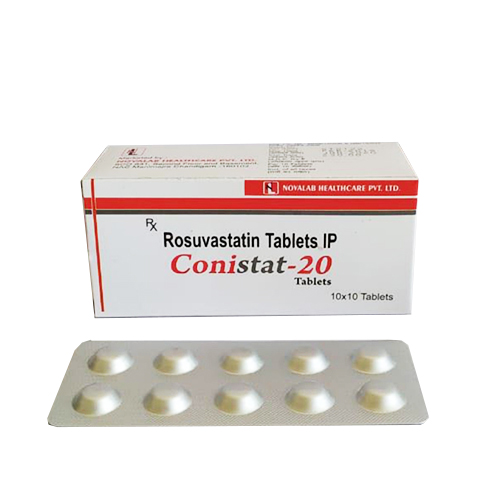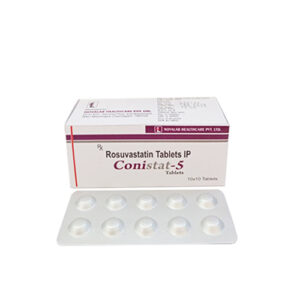- Home
- CARDIAC/DIABETIC PRODUCTS
- Rosuvastatin 20mg tablets

Rosuvastatin 20mg tablets
CONISTAT-20
Enquiry about Rosuvastatin 20mg tablets

Rosuvastatin 20mg tablets are a medication commonly prescribed to manage high cholesterol levels in the body. As a statin, Rosuvastatin works by inhibiting an enzyme involved in cholesterol production, thus reducing low-density lipoprotein (LDL) or “bad” cholesterol while increasing high-density lipoprotein (HDL) or “good” cholesterol. By regulating cholesterol levels, it helps lower the risk of cardiovascular diseases such as heart attacks and strokes. The 20mg dosage signifies the strength of the tablet, indicating the amount of active ingredient, Rosuvastatin, present in each dose. It’s crucial to follow medical advice and maintain a healthy lifestyle to effectively manage cholesterol levels and reap the benefits of this medication.
Benefits of Using Rosuvastatin 20mg tablets
Using Rosuvastatin 20mg tablets offers several benefits for managing cholesterol levels and cardiovascular health. The medication effectively reduces “bad” cholesterol (LDL) and triglycerides, while increasing “good” cholesterol (HDL). This lowers the risk of heart attacks, strokes, and other heart-related complications. By inhibiting cholesterol production in the body, Rosuvastatin helps prevent the buildup of plaque in arteries, promoting better blood flow. It’s particularly beneficial for individuals with high cholesterol, those at risk of cardiovascular diseases, and those unable to manage cholesterol through lifestyle alone. Regular use, combined with a healthy lifestyle, can lead to improved heart health and overall well-being.
How to Use Rosuvastatin 20mg Tablets
To use Rosuvastatin 20mg tablets, follow your doctor’s instructions. Typically, take one tablet orally with or without food, at a consistent time each day. Swallow it whole with water; do not crush or chew. Dosage vary based on your specific health profile. Regular monitoring of cholesterol levels is important. Adhere to a healthy diet, exercise, and avoid excessive alcohol while using this medication. Inform your doctor of other medications you’re taking, as some interactions occur. Report any unusual muscle pain or weakness, as well as any side effects, to your healthcare provider. Do not stop or adjust the medication without consulting your doctor.
How Rosuvastatin 20mg tablets Works
Rosuvastatin 20mg tablets work by inhibiting an enzyme called HMG-CoA reductase, a key player in cholesterol production in the liver. By blocking this enzyme, the medication reduces the liver’s ability to synthesize cholesterol. This leads to a decrease in low-density lipoprotein (LDL) or “bad” cholesterol levels, as well as triglycerides. Additionally, Rosuvastatin promotes an increase in high-density lipoprotein (HDL) or “good” cholesterol. As a result, the medication helps prevent the accumulation of cholesterol-rich plaques in arteries, promoting better blood flow and reducing the risk of cardiovascular diseases like heart attacks and strokes.
Precautions While Using Rosuvastatin 20mg Tablets
When using Rosuvastatin 20mg tablets, certain precautions should be taken. Inform your healthcare provider about your medical history, especially liver or kidney issues. Regularly monitor liver function while on the medication. Limit alcohol consumption, as it can increase the risk of liver problems. Consult your doctor before starting any new medications to avoid potential interactions. Report any unexplained muscle pain or weakness, as rare cases of muscle breakdown have been associated with Rosuvastatin. Pregnant or breastfeeding individuals should not use this medication. Maintain a balanced diet and exercise routine while taking Rosuvastatin to enhance its effectiveness in managing cholesterol levels.
Side Effects of Using Rosuvastatin 20mg Tablets
Using Rosuvastatin 20mg tablets might lead to certain side effects. Common ones include headache, muscle pain, and stomach discomfort. Rarely, more serious effects like liver problems, allergic reactions, or muscle breakdown can occur. Notify your doctor if you experience any unusual symptoms. A rare but severe side effect is rhabdomyolysis, characterized by muscle pain, weakness, and dark urine. This requires immediate medical attention. Additionally, long-term use could potentially lead to diabetes or memory loss, although the risk is low. It’s crucial to weigh the benefits against the risks and consult your healthcare provider for personalized guidance.





